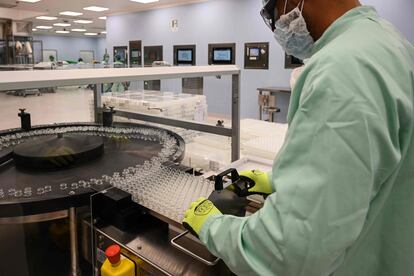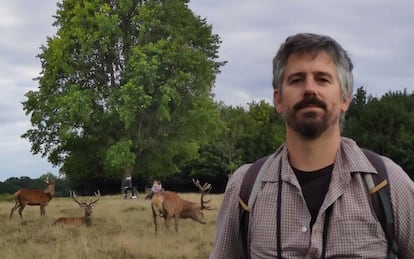Spanish volunteer in Oxford vaccine trial: ‘For me the real risk is that people aren’t vaccinated’
EL PAÍS talks to Ezequiel Martín about why he decided to participate in the coronavirus study and how he feels about the fact that one of the participants has fallen ill

Ezequiel Martín is from the Spanish province of Málaga but has been living in London for more than 10 years. The 46-year-old works as a computer specialist at Deutsche Bank. When the coronavirus pandemic broke out, he, like many others, tried to read as much information about what was happening. It was during this research that he saw that volunteers were needed for the trial of the coronavirus vaccine being developed by Oxford University and the British-Swedish drug company AstraZeneca. He didn’t think twice about signing up. “This has to be important. I want to take part,” he told himself.
The Spanish government is set to receive 31 million doses of this vaccine candidate as part of a joint deal struck by the European Commission. On the back of this news, Spanish Prime Minister Pedro Sánchez said last Monday that: “We hope to begin vaccinating part of the population of Spain in December.” Health Minister Salvador Illa also confirmed that Spain should have three million doses of the Oxford University vaccine candidate by December.
But on September 8, a spokesperson for AstraZeneca announced that the Phase 3 trial had been put on hold after one of the participants fell ill. Despite the bad news, Martín is still eager to take part in the trial. On Saturday, Oxford University announced that the trial had been deemed safe to continue.
Question. What did you think when you found out that a volunteer had been hospitalized and the trials suspended?
Answer. I think that it is one person among the nearly 100,000 of us who have already received the vaccine. It doesn’t seem like a lot, it’s an acceptable risk. We are talking right now about reopening the world, as they say. For me, the real risk is that people are not vaccinated and that we are all still going out on the street.
Q. Are you still committed to taking part in the trial?
A. Yes, of course. As soon as they resume the trial, they have already said they are going to call me again to fix a date for the second vaccine [he received the first shot in June]. And I will be there.
The reaction of most people was: “Oh, don’t you think that’s dangerous?”
Q. What did your wife say when you decided to sign up?
A. That this is just like me, that I sign up to everything – a bombing raid if necessary. It’s true that I never thought of it as something risky. It was Phase 3. They had already done safety studies and given it to lots of people. But when I mentioned it to her and other friends, the reaction of most was: “Oh, don’t you think that’s dangerous?” What’s funny is that I rushed to sign up because I thought for sure everyone would want to do it.

Q. Did they warn you of the risks?
A. Yes, at the beginning they sent me a lot of paperwork and a lot of information about the possible side effects. Some were very normal, like I was going to have a fever and that my arm would hurt for a few days. But in the end, nothing happened to me, although they wanted to be sure. They also spoke to me about other, more serious effects, possible rare diseases, but they made it clear that the likelihood was low, one in 10,000 cases. They assured me that I would be kept up to date at all times, and were wonderful with their explanations.
No one at any time said that this was going to be a miracle cure that would make the disease disappear
Q. How did you find out about the situation with the volunteer?
A. They called me up personally, before it made the news. It happened just as I was waiting for the call for the second meeting. They told me that there was a case of a person who had had something, and that the process was suspended while they investigated what had happened. It was something, to be sure, that they had explained to be before I was made aware of the protocol.
Q. And do you trust them?
A. Yes, a lot. The first tests were done in the University College Hospital in London, where my daughter was born. They are very serious and that gave me a lot of security. I know that they have been doing a lot of research there for a long time.
Q. Do you think the trial will be successful?
A. Yes, because what is happening right now is what they said was going to happen, according to the forecasts. No one at any time said that this was going to be a miracle cure that would make the disease disappear. But it seems like they are moving very quickly. It won’t be perfect, or a complete barrier so that you can go outside and do anything you want.
Q. How long have you committed for?
A. One year. If everything goes like they think it will, there will still be time to make everyone happy. But they told me that, if the figures were good, they would end it earlier. And at that time, they would tell us if we were in the control group or in the study [which received the vaccine candidate and not the placebo]. If I was in the control group, they would offer me the chance to have the vaccine at that very moment.
English version by Melissa Kitson.
Tu suscripción se está usando en otro dispositivo
¿Quieres añadir otro usuario a tu suscripción?
Si continúas leyendo en este dispositivo, no se podrá leer en el otro.
FlechaTu suscripción se está usando en otro dispositivo y solo puedes acceder a EL PAÍS desde un dispositivo a la vez.
Si quieres compartir tu cuenta, cambia tu suscripción a la modalidad Premium, así podrás añadir otro usuario. Cada uno accederá con su propia cuenta de email, lo que os permitirá personalizar vuestra experiencia en EL PAÍS.
¿Tienes una suscripción de empresa? Accede aquí para contratar más cuentas.
En el caso de no saber quién está usando tu cuenta, te recomendamos cambiar tu contraseña aquí.
Si decides continuar compartiendo tu cuenta, este mensaje se mostrará en tu dispositivo y en el de la otra persona que está usando tu cuenta de forma indefinida, afectando a tu experiencia de lectura. Puedes consultar aquí los términos y condiciones de la suscripción digital.









































